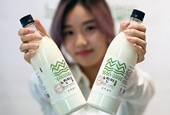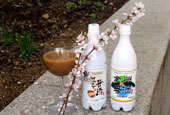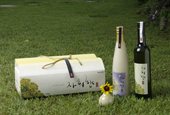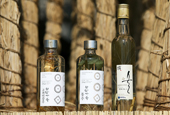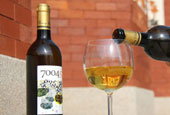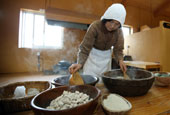In Oriental medicine, the lotus is considered a very useful medicinal ingredient often used in foods and drinks. According to the Dongui Bogam, a well-known medical book from the Joseon era (1392-1910), the lotus flower helps regain energy and protects internal organs so that they can recover from disease and feel comfortable. In fact, the lotus boosts blood circulation and helps control blood sugar and lose weight. It is also good to treat wounds and helps stop bleeding. The white lotus flower, or baengnyeon (백련 in Korean), is mostly used in favor of red lotuses which are toxic.
Buddhist monks during the Goryeo Dynasty (918 – 1392) were aware of the medicinal effect of white lotus. These monks brewed an alcoholic beverage in their temples called gokcha, meaning grain tea, which was considered an energy drink. When brewing the beverage, they included petals of lotus flowers or whole flowers to add more flavor and fragrance. They called this drink baengnyeon gokcha or white lotus grain tea. The secret recipe of the temple was used to make this alcoholic drink -- Baengnyeon Makgeolli -- which has a light and clean finish with slightly sweet flavor.
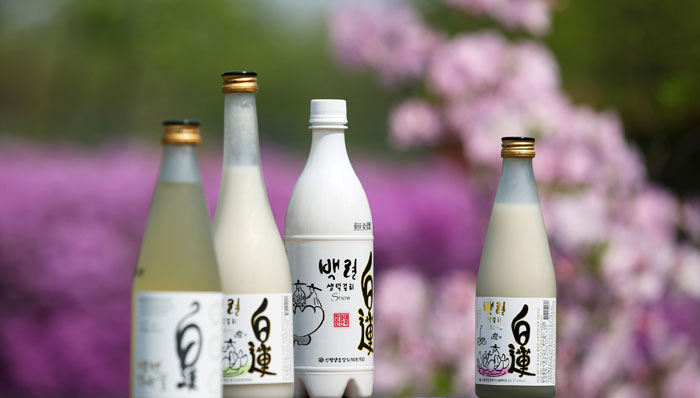
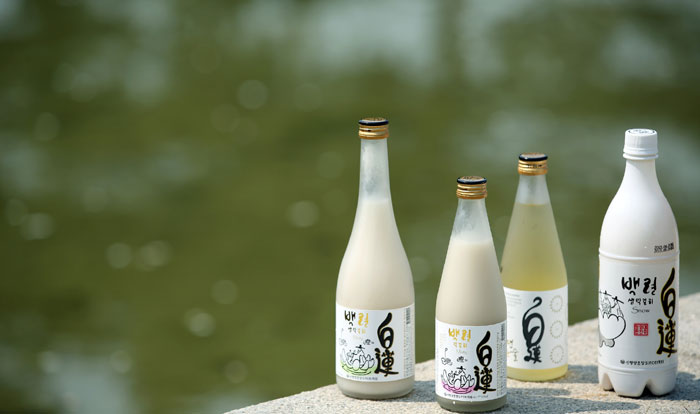
Established in 1933 in Dangjin, Chungcheongnam-do (South Chungcheong Province), Shin Pyeong Brewery has been producing Baengnyeon Makgeoli for more than 80 years. During the postwar recovery period after the Korean War (1950-1953), the family who owned the brewery learned techniques from a master brewer who moved to Dangjin from Hwanghae-do (Hwanghae Province), North Korea. They focused on building their own knowhow and developing technology backed by experience and research.
Those who dislike makgeolli due to its unique taste and strong alcohol proportion can still enjoy Baengnyeon Makgeolli; these fermented rice beverages come in four types according to the production method and alcohol degree.
For those who prefer a lower alcohol level and light taste, Baengnyeon Makgeolli Snow is recommended. Baengnyeon Makgeolli Misty is characterized for its soft and subtle taste. There is also a pasteurized Baengnyeon Makgeolli Misty that can be stored for up to six months. If you prefer a stronger and richer taste, try Hayan Yeonkkot Malgeunsul, (하얀연꽃 맑은 술 in Korean), meaning clean beverage with white lotus, with 12 percent alcohol. All variations are made from rice produced locally in Korea.
Baengnyeon Makgeolli Misty won the top prize in the unpasteurized makgeolli category at the 2014 Korean Liquors Contest hosted by the Ministry of Agriculture, Food and Rural Affairs. This beverage can be found at branches of large retailer Homeplus and duty-free shops around Korea. It is also on the menu at Chez Maak's two locations at Garosu-gil and Gangnam Station.
By Yoon Sojung
Korea.net Staff Writer
arete@korea.kr
* Please visit the brewer's homepage (http://www.koreansul.co.kr) or call +82-41-362-6080 for more information.
Buddhist monks during the Goryeo Dynasty (918 – 1392) were aware of the medicinal effect of white lotus. These monks brewed an alcoholic beverage in their temples called gokcha, meaning grain tea, which was considered an energy drink. When brewing the beverage, they included petals of lotus flowers or whole flowers to add more flavor and fragrance. They called this drink baengnyeon gokcha or white lotus grain tea. The secret recipe of the temple was used to make this alcoholic drink -- Baengnyeon Makgeolli -- which has a light and clean finish with slightly sweet flavor.


White lotus flowers are added to the fermentation process of brewing Baengnyeon Makgeolli.
Established in 1933 in Dangjin, Chungcheongnam-do (South Chungcheong Province), Shin Pyeong Brewery has been producing Baengnyeon Makgeoli for more than 80 years. During the postwar recovery period after the Korean War (1950-1953), the family who owned the brewery learned techniques from a master brewer who moved to Dangjin from Hwanghae-do (Hwanghae Province), North Korea. They focused on building their own knowhow and developing technology backed by experience and research.
Those who dislike makgeolli due to its unique taste and strong alcohol proportion can still enjoy Baengnyeon Makgeolli; these fermented rice beverages come in four types according to the production method and alcohol degree.
For those who prefer a lower alcohol level and light taste, Baengnyeon Makgeolli Snow is recommended. Baengnyeon Makgeolli Misty is characterized for its soft and subtle taste. There is also a pasteurized Baengnyeon Makgeolli Misty that can be stored for up to six months. If you prefer a stronger and richer taste, try Hayan Yeonkkot Malgeunsul, (하얀연꽃 맑은 술 in Korean), meaning clean beverage with white lotus, with 12 percent alcohol. All variations are made from rice produced locally in Korea.
Baengnyeon Makgeolli Misty won the top prize in the unpasteurized makgeolli category at the 2014 Korean Liquors Contest hosted by the Ministry of Agriculture, Food and Rural Affairs. This beverage can be found at branches of large retailer Homeplus and duty-free shops around Korea. It is also on the menu at Chez Maak's two locations at Garosu-gil and Gangnam Station.
By Yoon Sojung
Korea.net Staff Writer
arete@korea.kr
* Please visit the brewer's homepage (http://www.koreansul.co.kr) or call +82-41-362-6080 for more information.
